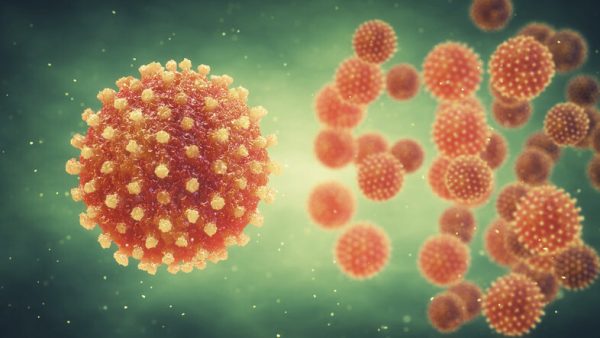Virus Definition
A virus is a nonliving protective shell with genetic material inside of it. For example, COVID-19 is a virus that infects human respiratory system cells.
View Lesson on Bacteria & Viruses
If you are on a school computer or network, ask your tech person to whitelist these URLs:
*.wistia.com, fast.wistia.com, fast.wistia.net, embedwistia-a.akamaihd.net
Sometimes a simple refresh solves this issue. If you need further help, contact us.
Bacteria & Viruses
Fun Facts
- Viruses need host cells to reproduce and then burst out, infecting other cells.
- Most viruses on Earth only infect and kill bacteria.
- Viruses don't move on their own and don't eat anything.
Why Do We Need To Know About
Learning about viruses helps us know how they affect our health and why it’s important to stop them from spreading. Sayings like “You should stay home when you’re sick so you don’t give the germs to others” and “Washing your hands gets rid of germs that can make you sick” show why it’s good to keep clean and stay away from others when sick to stop viruses from spreading and making more people sick.
Also, scientists who study viruses work on finding ways to treat and prevent diseases, like the vaccines for COVID-19. By understanding how viruses multiply and infect people, they can make big advances in medicine. This helps in finding new ways to prevent and treat viral illnesses.
Frequently Asked Questions
Related Topics
- Air Mass Definition
- Amplitude Definition
- Analog Signal Definition
- Bacteria Definition
- Balanced Force Definition
- Cast Fossils Definition
- Chemistry Definition
- Chloroplasts Definition
- Compound Definition
- Definition Of Human Body Systems
- Definition Of Science
- Digital Signal Definition
- Electricity Definition
- Electron Definition
- Endoskeleton Definition
- Food Chain Definition
- Force Definition
- Fossil Record Definition
- Gravity Definition
- Heat Definition
- Light Definition
- Limited Resource Definition
- Magma Definition
- Magnetism Definition
- Matter Definition
- Metamorphosis Definition
- Meteorologist Definition
- Molecule Definition
- Newton’s 1st Law Of Motion Definition
- Ocean Current Definition
- Organelle Definition
- Photosynthesis Definition
- Physical Map Definition
- Prevailing Winds Definition
- Proton Definition
- Renewable Resource Definition
- Respiratory System Definition
- Season Definition
- Solubility Definition
- Sound Definition
- Species Definition
- Surface Runoff Definition
- Translucent Definition
- Virus Definition
- Water Definition
- Weather Definition
- Weather Map Definition
- Weight Definition
Select Grade
Select Subject
Skip, I will use a 3 day free trial
Enjoy your free 30 days trial

































































































































